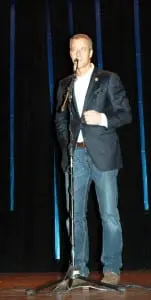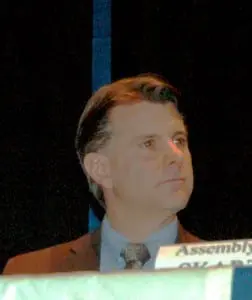Issues of education, gun control & fracking also surface at public forum
By Liz Schevtchuk Armstrong
Rep. Sean Patrick Maloney Tuesday night (Feb. 19) expressed guarded optimism about a deal in the U.S. Congress to stave off draconian federal budget cuts but warned his audience of low-income, labor and liberal activist groups to not expect Congress to endorse much of their agenda.
Joined by New York state Sen. Terry Gipson, who, like Maloney, represents Philipstown as well as other parts of the mid-Hudson Valley and was elected last November, Maloney fielded questions as part of a three-man panel at a forum in Poughkeepsie. State Assemblyman Frank Skartados, the last member of the trio — all Democrats — represents Poughkeepsie and Newburgh.

Asked about the federal budget and “sequestering” — a deep slice into funding for departments and programs across the federal government — Maloney replied: “This is a fancy word for a dumb idea that Congress came up with last year before any of us [newcomers] got there. This would be across-the-board cuts in a lot of things that help ordinary people. And it’s coming up fast,” unless Congress adopts an alternative approach.
“Some Republicans want to just let it happen because they don’t think they can get these cuts any other way” for deficit reduction, Maloney said. However, “I think there’s a good chance we’ll avoid it because it also cuts the defense budget and a lot of them don’t like that. And it cuts the defense budget in a really dumb way.”
An aide to President Bill Clinton in the 1990s, Maloney recalled that “we balanced the budget in the Clinton Administration, but we didn’t stop investing in infrastructure and education and technology and research. If we had left the Clinton policies in place, we would have a debt-free country today. We would not be $16 trillion in debt.”
Maloney praised President Barack Obama, who “for the first time in 22 years got the Republicans to agree to ask the very wealthiest to pay a little more [in taxes]. That’s a big deal, that he got that done.” Maloney proposed other steps as well. “We should stop giving tax breaks to corporations that ship our jobs overseas. I think we should also stop doing this corporate welfare for big oil companies, to the tune of $4 billion a year, for the most profitable companies on the planet. We don’t need to be subsidizing big oil.”

A questioner asked about eliminating rules that make welfare or benefits recipients work, a requirement that critics say amounts to forced labor and disrupts already fragile families. Maloney declined to oppose the practice per se. “The devil is in the details on this,” he said. “I support programs that give real training and real experience. I think it’s really important that the federal government offer folks opportunities to gain experience and get the skills they need to support themselves.”
However, if the poor are abused in mandatory work programs, “then that’s wrong,” he said. In terms of practical politics, he cautioned, “I don’t know that this Republican Congress is going to do anything of what you want. And I just don’t have the power as a freshman and minority member to make them. Let’s just be really clear.”
He made the same point in regard to other goals mentioned at the forum. As a single member of the House of Representatives he is limited and “I don’t have a big sack of money” to dispense to struggling Hudson River communities, he told the approximately 200 attendees.
Education funding
At the state level, Gipson proposed that one financial issue to tackle is school funding, now dependent on property taxes. He called for distributing funds statewide in a more egalitarian way, so economically strapped towns enjoy the same educational advantages for their children as their affluent counterparts. That means tax reform, too, he suggested. “People that own homes are leaving. It’s not affordable to live in this state and we have to change that.”
Fracking
Gipson also discussed climate change and “fracking” — the controversial method of obtaining fuel from underground rock formations. “We’re in a place that’s been hit by hurricane and storm, hurricane and storm,” Gipson said. “I’ve no doubt the climate is changing and we need to respond. This is one of the reasons I am so against fracking.” It consumes water better devoted to other uses, especially at a time of drought in much of the nation, and poses environmental risks, he said. “There are people who think that taking the water we have left and using it in a way that actually legalizes polluting it is somehow a good idea. And I just can’t get behind that,” he said.
Gun control
Maloney addressed gun control. “I may surprise some people,” he said. “I support the 2nd Amendment and I support people’s right to protect themselves in their homes with a firearm.” He said he also finds hunting, collecting guns, and target-shooting acceptable. “Those really aren’t the problem. I think the problem — particularly in these mass killings — is that we’ve got military-style weapons in the hands of people who’ve got serious mental illness.” To curb gun violence, he recommended more mental illness treatment, universal background checks, and a federal gun trafficking law. Moreover, he said, “I think we need to take a real look at high-capacity ammunition clips.”

